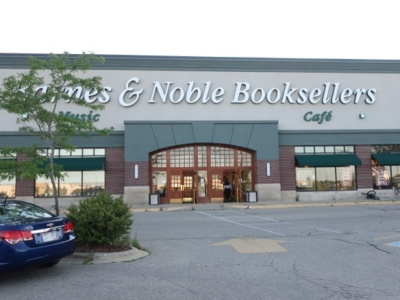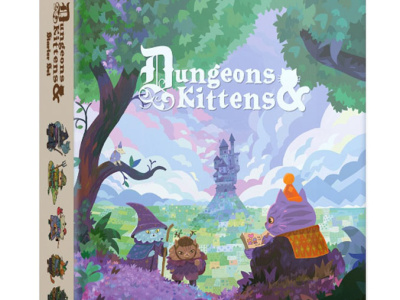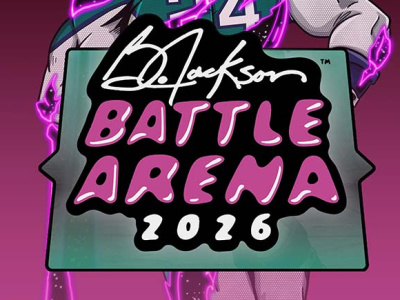In Business 3x3, a business retailer or executive will share their experience with three things they’ve done right, three things they’ve done wrong, and what else they’ve learned along the way.
Ryan Liebowitz had perhaps the two greatest mentors ever when it comes to comic retailing: Joe Field and Bill Liebowitz.
Joe Field is the owner of Flying Colors Comics in Concord, California, and the father of Free Comic Book Day. Bill Liebowitz? Well, he’s the Big Kahuna.
Bill Liebowitz was the outsized personality with the booming voice and Hawaiian shirts who founded Golden Apple Comics in 1979. He was also Ryan’s dad. But it was Field who started Ryan Liebowitz on the path he’s on today.
"I got my start outside of my family's business when Joe Field hired me on to essentially run WonderCon," Ryan says today. "I used to sell all the booths, invite all the guests, be the onsite manager, everything."
Ryan learned events management fast, later taking gigs at AIDS Walk Los Angeles and AIDS Walk New York before working in the events and conventions department at the Las Vegas Hilton and starting his own catering company in Vegas.
Then, in 2004, Bill Liebowitz passed away.
"I had a house in Vegas, I had these jobs, I had a career," Ryan says. "But when my dad passed…he was the guy behind Golden Apple. He was a legend in the field. I knew my course was clear. I looked at my wife, and I said, ‘That's it. This is what we're doing for the rest of our life, or at least until something better comes along.’"
Now 14 years along running Golden Apple, nothing better has come along, and Ryan Liebowitz has learned a lot.
THE GOOD
Embrace the Internet
"I'm not afraid of the Internet the way some older guys, like my dad, could be," Liebowitz says. "It was always real tricky for old‑school guys."
Liebowitz dove in Internet-first, but admits his first attempt resulted in "a real terrible website. It was just informative; sort of regurgitating a bunch of crap that people already knew. People want new content, and they obviously want to buy stuff."
Liebowitz redesigned the website in the last year, pumping it heavily with unique products, autographed items, Golden Apple-exclusive variants.
Liebowitz uses his website to move the interesting onesies and twosies he gets when buying collections.
"Every comic shop buys collections all the time—comics, toys, vintage stuff, junk, posters," he says. "For for the longest time, I just put it on eBay. But I don't need to be giving up those big percentages to PayPal and eBay to sell. Once I had a following on my own website, I could let people know this is where they go to get the real stuff, the good stuff. I finally cracked that in the last six months. Our web sales have increased, and the future is bright."
Use the Newsletter
Liebowitz has an email newsletter that’s so important to him, he considers it an aside to everything else Internet.
"We have events coming up, new product coming in, promotions coming up, celebrities walk in the door," he says. "There’s crazy stuff that goes on in the retail environment on a weekly basis. For years, I didn't know how to collect my thoughts and get it all out of my head."
Finally, Joe Slepski, a Golden Apple employee, insisted that Liebowitz do a newsletter. The newsletter took off when Liebowitz created an alter ego for himself. A suspected hit-and-run driver was fleeing the police, and tried to escape through Golden Apple. Liebowitz held her off long enough for the police to subdue her.
"Anyway, I got the nickname of Burleyman from the incident," Liebowitz says. And Burleyman became the header for the Golden Apple newsletter.
Liebowitz says the newsletter helps him connect with customers, and more.
"It's required reading for my employees," he says. "I don't have the luxury of having regular meetings with all the guys. I tell my employees, ‘Read the newsletter. That’s the regular meeting. If it’s in there, it’s important to me, and important to us.’"
Promote!
It’s important everywhere, and Golden Apple is a heavy promoter. Liebowitz thinks he’s learned something in it.
"The thing about promotions that I've learned is that it's really not about making money," he says. "It's a give-back to my customers. I feel like when they come here and meet a celebrity or a creator, they don't have to buy something. We've had free poster signings, free Q&As, free autographs with Gerard Way, John Carpenter, or Jim Lee, and sometimes, I lose money on it. That's okay. Customers remember, and they keep coming back."
Liebowitz draws a parallel anyone in comic retail should understand.
"That's the reason Free Comic Book Day works so well," he says. "It's promotions. We know it's marketing dollars. We want to give back to our customers."
THE BAD
Try to Manage Subscriptions
The great bugaboo of comic retail bites the ’Apple, too. In the days of the Big Kahuna, Golden Apple didn’t have a pull-and-hold service. But Ryan Liebowitz started one about seven years ago.
"We implemented one, and poorly," he laughs. "You can get burned real easy, man, because, number one, I was such a nice guy. I didn't take credit cards from people. I still don't."
Liebowitz says he doesn’t want to pressure his customers.
"Maybe somebody moved away and didn't tell us, maybe somebody lost their job, just normal stuff," he says. "Unfortunately, the communication wasn't there, and we learned a lot of lessons. We handle it better these days, and we always let people put back things that they don't want."
Don’t Screw Up the Numbers
Sub numbers are component of your larger numbers. And Liebowitz is still trying to tame them.
"As a retailer, the comic book industry is a numbers game, period," he says. "You will live and die by your numbers. And I screw it up all the time, even until this day."
Liebowitz points to writer changes, fill-in artists, and stories that just don’t deliver as the main culprits. And the cumulative effect can be crushing.
"If I order 10 extra copies of this, and 40 extra copies of that, and five extra copies of that, I'm screwed trying to pay my bill for the next week," he laments.
Liebowitz looks at it as a gamble, and keeps rolling the dice.
"I've had a lot of hits, and I’ve had a lot of misses," he says. "You have to follow trends, check all your information, and stick to your guns. That made-up word, ‘guesstimating,’ applies to comic book retailing."
Make the Right Decision
Again, Liebowitz has no problem changing things up.
"I change racking systems all the time," he says. "Sometimes it works, sometimes it doesn't. I sold a location. I downsized this location. I expanded online."
Liebowitz is always concerned about making the right decision.
"Here, it's a family business, so it has such more of an impact," he says. "If I screw up at a corporation, maybe I cost the company a few bucks, and I go on to make some better decisions down the road. But here, this is it. This is my livelihood. If I make a bad decision, this could end me. I hope that I'm a little more educated than I was when I started this."
Liebowitz has no problem taking things to committee.
"I ask my customers," he says. "I ask my employees. I ask my mom. I ask my wife. I’ll ask my dog, if I have to: ‘Should we do this?’ If the general consensus is ‘yes,’ I'm willing to take a shot on it."
Even within decisions, there are peaks and valleys. Liebowitz decided to do retailer variants a few years ago, and sticks with them, regardless of the results.
"I've probably done 30 of them, and 10 or 15 of them sucked and didn't sell, for whatever reason. But I've also recently made a lot of good ones, and that feeds the new website. There’s a lot of trial and error, but people want exclusivity."
AND WHAT ELSE?
"I’m a gambler. I enjoy being inside a casino, and I’m a gambler in life. I have no problem gambling on myself, my business, a whole new product line."
"A trap you have to avoid is becoming just a Diamond business. If we all order out of the same catalog, then I have the same stuff as everyone else in town, and even the same as a store in Chicago or New York. You have to carry other stuff, too; find other product lines, or if you have to, create the product lines yourself."
"Ordering isn’t ordering any more as much as it’s reordering. We're trying to lower the numbers every week on the weekly stuff. But what’s been going up is the evergreen stuff, and it’s reaching into our present. You used to always have to have a copy of Watchmen and Dark Knight Returns on your shelf. Now you better have Paper Girls, Saga, and Sex Criminals, too. It’s not just the 20, 30-year-old stuff that’s ‘backlist.’ You have to have volume 1 and volume 2 of all the current hot stuff on the shelves at all times."
"The other part of the Internet that I just never feared was the digital market for comics. Many thought it was going to be the end of comic book stores, and obviously, that has proven untrue. Really, I think digital comics only help us. Having a digital comic is a way for a casual reader to become a real reader, to someone who could soon come in your store. The digital market starts with freebies, a free download. Then they start getting into it. They read some more comics. Then they find us. Comic stores are an experience you can't replace that online."
"People are nostalgic for Golden Apple. I think that's my takeaway. This place meant something to their childhood or their yesteryears, sometimes 20-plus years ago. It had an impact. This might be where they met Jack Kirby or Stan Lee, or where they met Jim Lee or Todd McFarlane on the first day of release of their Image books. It strikes a chord in them. Golden Apple is old school. There's a cool factor you can't buy at any price."
Click Gallery below for photos of Golden Apple!
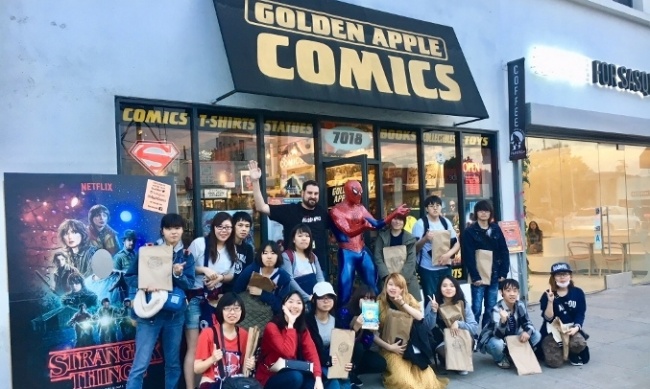
Using a Web Store, Newsletter, Watching the Subs, More
Posted by Jim McLauchlin on February 15, 2018 @ 3:57 pm CT
MORE COMICS
Madison, Wisconsin on August 10, 2025
August 15, 2025
We visited the large Barnes & Noble store in Madison, Wisconsin on a Sunday afternoon, and found manga and merch displays expanded.
Superheroes are Fresh, Author Titles are Stale, and Manga Just Keeps Plugging Along
August 14, 2025
DC Comics' Compact Comics and Marvel Comics' Premier Editions take over the Superhero chart with a flurry of newer titles, while the Author chart has just one new release.
MORE NEWS
New Fantasy RPG by Edge Studio
August 15, 2025
Asmodee will release Dungeons & Kittens Starter Set , a new entry level RPG set by Edge Studio, into retail.
In Second 'Bo Jackson Battle Arena' Booster Set
August 15, 2025
Bo Jackson Battle Arena, Inc. will release Bo Jackson Battle Arena 2026 - Ken Griffey Jr. Edition , a new TCG booster set, into retail.



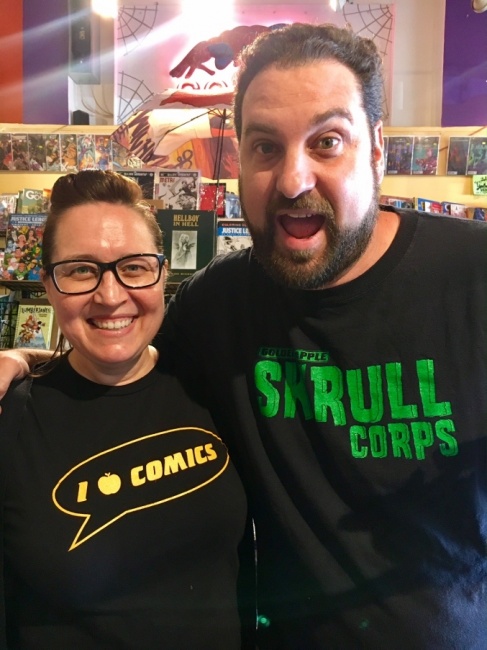
 View Gallery: 8 Images
View Gallery: 8 Images 